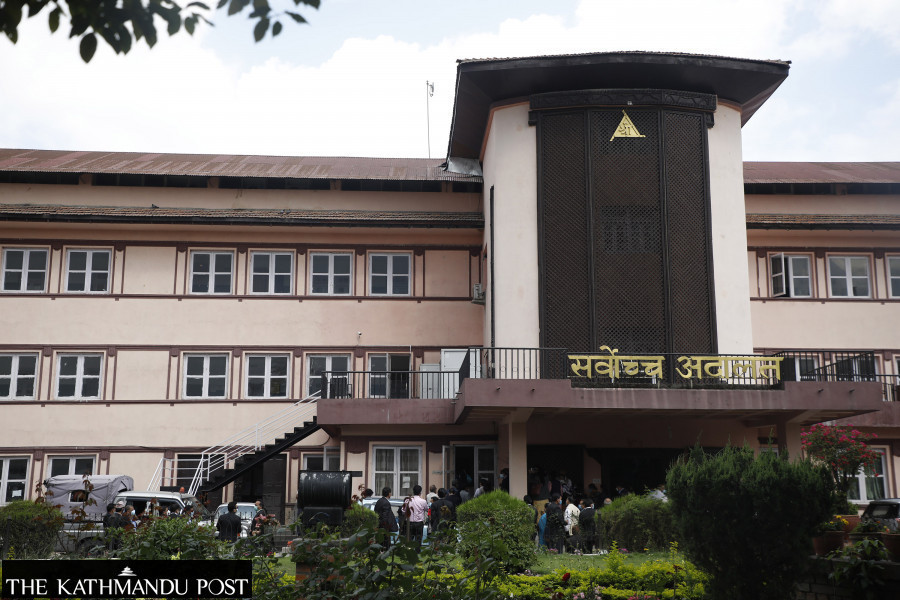National
Top court says all social media, online sites must register
Full text of verdict on the sidhakura.com case calls for a mechanism to monitor and evaluate online content.
Binod Ghimire
Amid the reluctance of many social media platforms to register in Nepal, the Supreme Court has ruled that they should be mandatorily listed and subjected to the monitoring and supervision of a competent authority.
An extended full bench of the top court has said that digital media and social media networks should also be made responsible and held accountable, and the use of social media under false or fictitious identities should be discouraged.
The full text of the verdict from September 29 last year, relating to a case against sidhakura.com, a Kathmandu-based news website and YouTube channel, issued on Saturday says: “Online and social media platforms of domestic or foreign origin should be mandatorily registered with the competent authority before operation, and mechanisms should be in place to evaluate and monitor undesirable content.”
The top court’s decision was released at a time when social media platforms, including Meta’s Facebook, were rejecting repeated directives from the Nepal government to register with the Ministry of Communications and Information Technology.
The bench led by then-chief justice Bishowambhar Prasad Shrestha said that as news circulated through electronic media reaches the general public widely and quickly, often going viral, false news can spread if proper rules and regulations for such media are not established.
Stating that the circulation of news through these media can harm citizens’ rights to get accurate information, obstruct judicial proceedings, and negatively affect public trust and credibility of courts, it has directed the government to make legal arrangements to check them.
“Appropriate legal arrangements should be made immediately, within the framework of the law, by regulatory authorities to ensure proper oversight, and other necessary measures should be taken in this regard,” reads the verdict.
The court has further said that the state is responsible for controlling false information, such as misinformation, disinformation, and malinformation. “If false information is allowed to flow, the work and orders issued by the court would be invalidated, and it would be challenging to decide on cases based on false information,” it further says.
The Shrestha-led bench, which also included incumbent Chief Justice Prakash Man Singh Raut, has concluded that the Press Council and other regulatory mechanisms need to be equipped with resources, including legal provisions, to control the flow of false information.
It has also directed the chief registrar to develop guidelines to be followed while carrying out the judiciary’s reporting without hampering its dignity, respect, public trust and credibility and asked the council to orient the journalists accordingly.
On April 26 last year, sidhakura.com published text as well as audio clips claiming that the chairpersons of two leading media houses met with incumbent and former Supreme Court justices as well as senior advocates to ‘dismiss’ over 400 corruption cases in the court. It had claimed that an April 21, 2021 court verdict was part of the deal.
On April 28 last year, the court launched a suo moto contempt of court case against the publisher and the editor of the website for publishing defamatory content against one of its justices. Govinda Ghimire, a deputy registrar at the top court, filed the writ petition claiming that “serious, fabricated and misleading audiovisual content published by the website was a malicious attempt to defame the judiciary”.
The extended full bench, which is rarely constituted, convicted the website’s publisher Yubraj Kandel, executive editor Nabin Dhungana, and Raj Kumar Timilsina, who provided the audio content to the online media team.
While imposing a six-month jail on Timilsina, it also announced three months for Kandel and Dhungana. Each of Kandel’s and Dhungana’s jail terms were reduced to seven days, arguing they begged the court for a conditional pardon.
“The content was produced and aired with a malicious intent to create obstruction in judicial service and defame and degrade the faith in the judiciary,” the verdict has concluded.




 17.12°C Kathmandu
17.12°C Kathmandu














